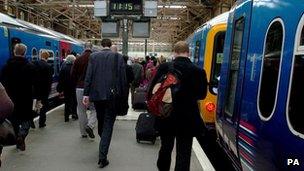Rail fares: Osborne to reveal cap on prices
- Published

Former Transport Secretary Philip Hammond called the British railway system a "rich man's toy"
The chancellor is to announce a cap on regulated rail fares in Tuesday's autumn statement on the economy.
Season tickets and peak travel fares were due to rise 8.2% in the new year - 3% over the RPI rate of inflation.
But George Osborne is now expected to announce that this will be restricted to 6.2%, and that the cap will apply to Tube and bus fares in London.
Shadow transport secretary Maria Eagle said ministers had backed down on "eye-watering" fare increases.
The Association of Train Operating Companies said the decision was a "positive move" for passengers.
Back in September, Transport Secretary Philip Hammond said it was an "uncomfortable fact" that trains were used by the better-off and some fares were "eye-wateringly expensive".
In an appearance before the Commons transport committee, he described the British railway system as a "rich man's toy".
"People who use the railway on average have significantly higher incomes than the population as a whole - simple fact," he said.
These sentiments echoed those expressed in a review into rail fares, the findings of which were published in May.
The review, led by ex-Civil Aviation Authority chairman Sir Roy McNulty, found that rail fares were "too high".
, which was commissioned by the previous government, concluded that rail fares in Britain should be made "less complex and more equitable".
Passenger groups have long called for a reform of the fare structure, because trains are often empty at the end of peak hours, but busier at the beginning of the off-peak period.
As well as the fare structure, the report's other main barriers to improving efficiency included the role of the government in the railways, the franchise system and the way in which "major players in the industry have operated".
Sir Roy said the cost of running the network should be 30% lower, bringing it in line with other European railways.
'Shocking' rises
A combination of more people travelling, above-inflation fare rises and cost-cutting led to rail users' contributions to the railways rising from 拢5bn in 2006-07 to 拢6.6bn in 2010-11.
Over the same period the amount contributed by taxpayers has fallen 拢6.3bn to 拢4bn.
Ms Eagle said: "Ministers appear to have finally backed down on their plan to impose eye-watering rail fare increases, as we have been demanding for the last year.
"Yet commuters are facing a fares fiddle unless the government also reverses its decision to allow train companies to average-out the revised fare rise across a range of tickets meaning many tickets will still rise by a shocking 9% in the new year."